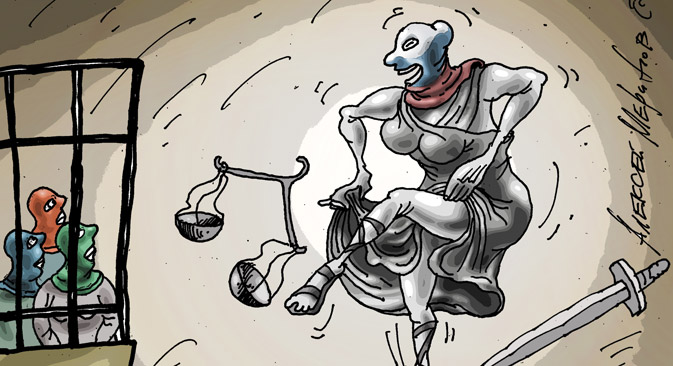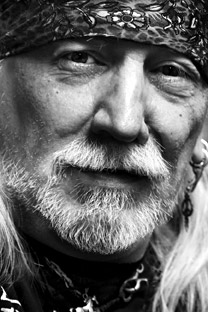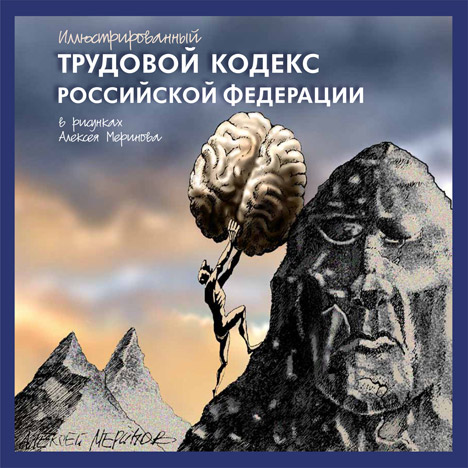
Femida. Source: Press Photo / Alexei Merinov
Alexei Merinov’s first cartoons were published 30 years ago, in the early 1980s. One of his recent projects was illustrating Russia’s penal and civil codes. The end result was funny, biting and educational at the same time.
Russia Beyond the Headlines: Russia has a fairly long tradition of political cartoons. Why do you think this genre is not quite as popular these days as it used to be?
 |
Alexei Merinov: 'Political
cartoons have been all but banished from the official media, so they have
migrated to the Internet.' Source: Press Photo |
Alexei Merinov: It is still popular, actually. Of course, it’s not like it used to be in Soviet times, when every paper would run cartoons showing hairy-handed, foreign imperialists and revanchists menacing our peaceful tractors as they grazed placidly in the field. But the genre is very much alive and kicking on the social networks, for instance.
Still, there is no denying that, after all the political upheavals, mistakes and disappointments, many Russians have lost interest in politics.
Political cartoons have been all but banished from the official media, so they have migrated to the Internet. Just look at all these photoshopped funny pics and demotivators sloshing around on the Web.
I am always puzzled, however, as to why the authors always find it absolutely necessary to add a caption. Back when I was young, editors would always get nervous when they saw a cartoon without a caption.
They would just add their own caption if I did not provide one. They feared, apparently, that people wouldn’t get it, or that they would get the wrong ideas otherwise.
Soviet times are well and truly in the past, but there are still lots of people around eager to tell other people what they should think.
RBTH: Have you finished illustrating the Penal Code?
A.M.: Yes, that project is done. I have finished the Penal Code and the Civil Code, and I’ve just completed the Labor Code. I had never expected the Labor Code to be such an interesting subject to illustrate in cartoons.

The Labor Code. Source: Press Photo / Alexei Merinov
I’ve done it with a leftist slant: It's full of Soviet sickles and hammers, greedy fat cats and senior Russian bureaucrats.
RBTH: Do you have any favorite public figures that generate a constant stream of work for you?
A.M: All through the 1990s, I kept lampooning Yeltsin, Prime Minister Chernomyrdin and Yuri Luzhkov, the former mayor of Moscow. It was very interesting at first; it was something of a novelty to be able to laugh at our own senior politicians who were still in office at the time. Yeltsin always looked like a potato in my cartoons. Chernomyrdin was like a dinner plate with bushy eyebrows.
But then I just got sick and tired of it. Don't get me wrong: I still satirize officials and politicians sometimes. But I find it much more interesting to come up with interesting scenarios and situations.
I’ve had some funny stories in real life. I once got a phone call from the Swiss Embassy: Two of their diplomats were leaving, and they wanted to buy some of my cartoons before leaving Moscow.
I said, “No problem.” But then I noticed that the cartoons they picked were not some generic "philosophical" stuff without captions. They were all biting political satire about our life here in Russia.
So I asked them, “Why would you want such stuff?” And they said: “We've served here for so long that we can't imagine life without Russia anymore.
And then again, what kind of news do you think we have back home in Switzerland?
Someone falls off his bike, and all the papers run it as front page news. Here in Russia, you have some proper horror stories.”
Of course, I'm being slightly cynical, but that's how the media work. They need news stories, and not all of these stories are a laughing matter.
RBTH: If you had to cover not only Russia but foreign countries as well, who would be the target of your satire?
A.M.: I have long had no illusions about what life is like in the West. I'm sure there would be plenty of work for me there.
But I’d try not to stoop to the old Soviet imagery of imperialists and revanchists, with their hairy and greedy hands. After all, there are plenty of fools in every country for me to poke fun at.
All rights reserved by Rossiyskaya Gazeta.
Subscribe
to our newsletter!
Get the week's best stories straight to your inbox